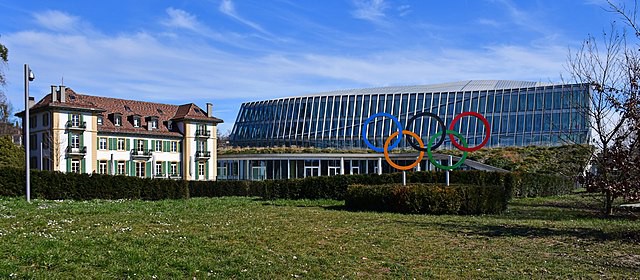There has been no shortage of culture war outrage surrounding the Olympics in 2021, from Simone Biles disappointing scores of right-wing talking heads to the inane discourse about anti-sex beds. Since the competitions include nearly every country and territory on the planet, anyone can have an opinion or hot take about the event as if they are also participating. There are, of course, hundreds of hours of television coverage and thousands of articles covering the actual events themselves as well, focusing on the athletes and the storylines that describe their victories and failures. Given all of this media frenzy one might think that the impact of the Olympics on working-class people around the world would be discussed often, but we rarely see discussion of how the Olympics fits into the capitalist systems that shape the daily lives of normal people in host nations every two years.
The International Olympic Committee’s stated mission includes eighteen points about stewarding the “Olympic movement,” including their goal “to take action to strengthen the unity of the Olympic Movement, to protect its independence, to maintain and promote its political neutrality and to preserve the autonomy of sport.” Of course, the Olympics is not and has never been politically neutral, and athletes throughout the years have used their platforms to make political points, even while the IOC really does not want them to do so. This year has shown to be especially driven by explicit political decisions, as the games were postponed a year but ultimately held this summer despite the vast majority of Japanese voters opposing them. Why would a supposedly politically neutral sports governing body force through a massive event bringing tens of thousands of people to a barely vaccinated nation?
As Jules Boykoff, scholar at Pacific University, told Jacobin, “[the Olympic project] is essentially an exercise in trickle-up economics, where the money flows upward into already well-endowed entities like the International Olympic Committee, and well-positioned political and economic elites.” There is simply too much money on the line to cancel a cycle of the Olympics ‒ money that does not go to athletes but instead to television broadcasters, real estate developers, and the IOC itself. According to Boykoff, Olympic athletes only receive 4.1% of Olympic revenue compared to 45–60% in the largest professional sports leagues around the world. This money is certainly not making it into the hands of host city residents either, as they are much more likely to be physically displaced or at least inconvenienced by the event than to have their lives materially improved. In 2007, it was reported that over 2 million people had been displaced in order to hold Olympics events over the prior 20 years. That number has only grown as the IOC’s appetite for growth has not slowed.
Even Marketwatch, a publication that is not shy about its support of corporate wealth and Wall Street, admits that “many Olympic Games are not profitable for the host city.” They go on to explain that “the 2008 Beijing games generated $3.6 billion in revenue, but the host city spent more than $40 billion, and the 2012 Summer Olympics in London generated $5.2 billion compared with $18 billion in costs.” In other words, billions of dollars of public funding ends up going to real estate deals, marketing, and a myriad of other expenses that do not directly benefit working people.
Even with clear numbers showing the costs of hosting the Olympics, city officials around the world continue to lobby and jockey for their opportunity to play host. In a just world this could indeed be a cause for celebration instead of an inevitable disaster for millions of normal people. The only reason a global sporting event has turned into such a monstrous robbery of working people is that capitalism prioritizes growth and profits above all else. If there is an opportunity for making money, someone will take it. While the IOC and real estate developers may personally benefit from the Games each cycle, the problem is at a systemic level. While capitalism will certainly be around for some time, there is work we can do to fight the worst effects in the meantime, power we can build in our drive to topple the system of exploitation that defines how we spend our days. We can build organizations like DSA to ensure that democratic decisions dictate city deals with groups like the IOC and we can ensure that our friends and neighbors understand that there are heavy costs to something as glamorous as the Olympics.
This is the eighteenth installment of Austin DSA’s “Class Enemy of the Week” series. You can find the seventeenth, on the billionaire class’ flight to space, here.

